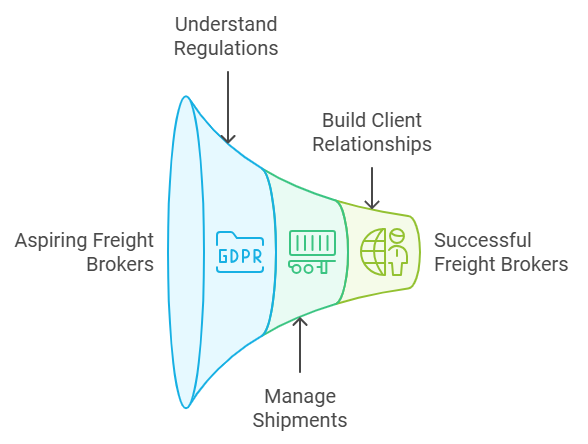Introduction
Freight broker training courses play a crucial role in the logistics industry. Whether you are a beginner or an experienced professional, mastering freight broker skills can significantly enhance your success and efficiency in thefield. This blog post will guide you through the essential steps to understand and excel in freight broker training courses, helping you achieve your desired outcome of becoming a successf ul freight broker.
The Importance of Freight Broker Training Courses
Understanding the Basics
Freight brokerage involves acting as an intermediary between shippers and carriers to facilitate the transport of goods. It’s a key component of the logistics industry, providing opportunities for individuals to manage logistics efficiently while driving their business growth.
Role and Responsibilities
Understanding the fundamental differences between a freight broker and a freight agent is crucial. This includes grasping various responsibilities such as managing daily operations, liaising with shippers and carriers, and ensuring compliance with regulations.Regulations and Compliance
Navigating the legalities in freight brokerage is foundational. Licensing requirements and compliance with federal regulations are the bedrock of operating successfully and avoiding legal pitfalls. Essential Skills for Freight Broker Training
Operations Management
Learning the intricacies of operations management, including record keeping and financial management, is essential. Familiarity with industry-standard software is equally important for managing consignments and communications effectively.
Sales and Marketing
Effective lead generation and negotiation skills are vital for success. These skills help brokers in acquiring clients and negotiating profitable contracts with both shippers and carriers.
Rate Analysis and Pricing
Understanding how to analyze market rates based on supply and demand plays a crucial role in setting competitive pricing, thus affecting the bottom line significantly. Providing accurate quotes can enhance client trust and business reliability.
Steps to Mastering Freight Broker Training
Step 1: Education and Certification
Education and certification are crucial first steps in building a strong foundation. Consider enrolling in reputable courses like those offered by Kopf Logistics Group or career training programs at various institutions such as Nash Community College and FIU.
Step 2: Practical Experience
Practical experience is irreplaceable. Engage in internships or apprenticeships to gain hands-on experience and understand real-world applications of your training, which can help bridge the gap between theory and practice.
Step 3: Continuous Learning
The logistics industry is ever-evolving, with new trends and regulations emerging regularly. Attending conferences, workshops, and keeping abreast of industry publications can aid in continuous learning and ensure you remain a competitive player in the field.
Conclusion
Mastering freight broker training courses requires more than just an understanding of the theoretical concepts; it involves a blend of solid education, hands-on experience, and an unwavering commitment to continuous learning. To truly succeed in the competitive logistics industry, it is crucial to first grasp the core fundamentals, including the principles of supply chain management, transportation regulations, and effective communication strategies. Alongside this, developing essential skills such as negotiation, problem-solving, and managing relationships with carriers and shippers will significantly enhance your ability to navigate the industry’s challenges.
Progressing through structured training programs helps in building both knowledge and confidence, as you gain practical experience through real-world case studies, simulations, and mentorship. However, the learning process does not stop at completing a training course. The logistics industry is dynamic, with regulations, technologies, and market conditions constantly evolving. Therefore, maintaining a commitment to continuous learning is key to staying ahead of the curve.
By consistently upgrading your knowledge, networking with industry professionals, and staying informed on industry trends, you will not only improve your expertise but also increase your value as a freight broker. With determination and the right skill set, you can confidently navigate the complexities of freight brokerage, overcome obstacles, and achieve long-term success in this fast-paced and rewarding field.
Growth + Change = Opportunity!




